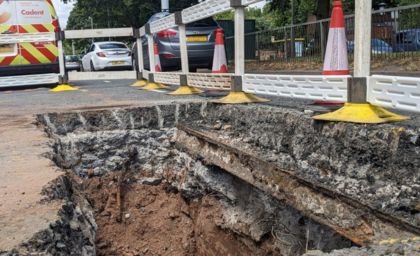A gas pipe buried under Aigburth Road, Liverpool – unseen since the 1860s – is today causing a major headache for engineers who need to fix it.

(photo shows old tram tracks exposed during the initial works)
Cadent, which manages the local gas network, was alerted by a member of the public to a smell of gas – indicating a leak – and have traced it to this pipe.
Everything is under control, but essential repairs need to made.
The pipe – near to Home Bargains, and opposite Sefton Park Library – runs directly beneath the central white line of the two city-bound lanes.
To access it, the team needs to dig a 3m-deep, 3m-wide pit – taking up both lanes.
Cadent has prepared a plan, in conjunction with Liverpool City Council and emergency services, that will involve a change – for around two weeks – to the flow of traffic along Aigburth Road, L17.
Teams will tomorrow (13th July) begin work to remove a couple of street lighting columns in the central reservation and lower the raised embankment.
This will enable – from Sunday (16th July) – the city-bound traffic to merge into one of the two lanes on the opposite side of the carriageway.
It means traffic can continue to flow in both directions, but instead of two lanes each way, there will only be one.
“This pipe is from a different era, when no-one could possibly have imagined the type of traffic that runs above it today,” said Dale Martin, Customer Operations Area Manager, Cadent. “We’d hoped the pipe might be confined to one lane, but we now know it straddles both, and that’s created a big challenge for us.”
Dale added: “What we’re going to do, having consulted the city council and emergency services, is keep traffic flowing in both directions by making some temporary changes to the central reservation.
“I think motorists should still be prepared for traffic to build up and, if they have other routes they can take, it would be wise to do so while we carry out this work.
“The leak itself is under control, but to fix it we need to expose the full circumference of the pipe so that we can carry out a repair technique called ‘encapsulation’. This is basically us wrapping the part with a special casing, stopping the leak.
“I would like to thank everyone for bearing with us – keeping everyone safe is always going to be our first priority, but we are working hard too in order to find ways to keep unavoidable disruption to a minimum.”
As they dug down to the pipe, the Cadent engineers exposed more of the city’s history – tram lines which were left in situ and buried beneath the new road surface when trams stopped being a feature of Liverpool in the 1950s.
If you smell gas during this work, nearby or anywhere, always ring the national gas emergency service immediately, day or night, on 0800 111 999*. Do not delay, or assume it’s related to this work. It may not be and must be checked.
Cadent operates four of the UK’s eight gas distribution networks – North West England, West Midlands, Eastern England, and North London.
Its North West network stretches from the Lake District to Crewe and is home to 21,000 miles of distribution pipes (most of them underground) and hundreds of above ground installations. If placed end to end, that amount of pipes would stretch from Liverpool to Sydney, Australia, and back again.
Around £800m will be invested in the North West’s gas network over the next five years. This will maintain safe, secure supplies to homes, hospitals, schools, offices, and other sites, as well as support the UK journey to net zero carbon emissions.
Backed by Cadent and many partners, the North West region is set to lead the way in a major shift from fossil gases to hydrogen. Producing only heat and water at point of use, hydrogen is key to the UK’s net zero future and is set to be introduced at volume in the North West during the 2020s.
ENDS
*All calls to are recorded and may be monitored.
Cadent is the UK’s largest gas distribution network with a 200-year legacy. We are in a unique position to build on strong foundations whilst encouraging the curiosity to think differently and the courage to embrace change. Day to day we continue to operate, maintain and innovate the UK’s largest gas network, transporting gas safely and protecting people in an emergency. Our skilled engineers and specialists remain committed to the communities we serve, working day and night to ensure gas reaches 11 million homes from Cumbria to North London and the Welsh Borders to East Anglia, to keep your energy flowing.
Here at Cadent we support the Government’s plans to reach Net Zero by 2050. That means we’re backing the introduction of hydrogen as a low carbon alternative to natural gas for the future. We know people love the controllability of gas and, with our network already in place, it makes sense to switch to the lower carbon alternative offered by hydrogen, which we believe can keep homes and businesses warm for generations to come.
Cadent manages the national gas emergency service free phone line on behalf of the gas industry - 0800 111 999*
Cadent Gas Ltd is owned by a consortium of global investors.
*All calls are recorded and may be monitored.